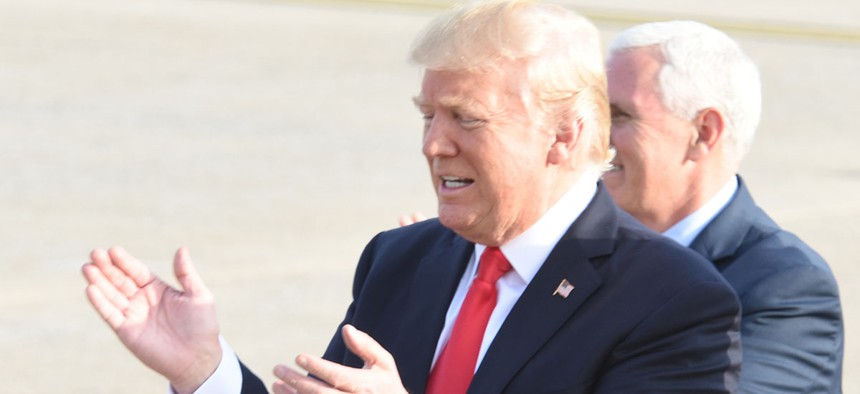
Master Sgt. Culeen Shaffer/Shutterstock.com
Politics is Distracting American Workers and May Be Killing U.S. Productivity
There is a real, measurable cost to the drumbeat of disturbing news coming out of Washington.
America’s national obsession with White House revelations tumbling out on a daily (sometimes hourly) basis appears to be sapping productivity.
We’ve had survey data for a while to suggest a hit on US productivity was coming. A February survey commissioned by goal-tracking software BetterWorks found almost a third of American workers reported lower productivity at work since the 2016 election. The survey of 500 full-time workers found about half had engaged in political arguments at work and 87% were reading political social-media posts on the clock. A second survey by the American Psychological Association (pdf) in September found one in four US employees were negatively affected by political talk at work, with those under the age of 34 particularly hard hit.
It’s finally seems to have taken a toll. The Labor Department reported the first productivity data since the November election on May 4. Although economists had been expecting a 1.3% growth rate during the first quarter, productivity (hourly output per non-farm worker) actually fell to -0.6%.
Productivity figures bounce around, so it’s too early to draw a definitive line to political distractions, but management consultant Bill Catlette, former head of human resources at FedEx, isn’t surprised. He blames the political turmoil he sees at workplaces around the country.”The workforce is more disengaged and distracted than it ever has in my lifetime,” he said told Quartz.
Catlette is now advising executives dealing with political angst invading the workplace from both conservatives and liberals. While everything from inefficient managerial structures to legalized marijuana can affect productivity, politics has shot up the ladder of concerns. “It’s beyond distraction,” he said. “It’s dysfunctional.”
The chaos that surrounded Donald Trump’s presidential campaign has only been amplified during his time in the White House. Rocked by a nearly continuous specter of scandal, the administration now faces a special counsel investigating possible improper contacts with Russian officials. And now that political turmoil is seeping into everyday American life in a deeply divisive way.
For HR departments, it feels like a siege. One consultant described it as having the March Madness basketball tournament on all the time, while another is struggling to manage the news notifications flooding employees’ phones. “People are not just concerned about the future of their jobs,” one technology executive told the Washington Post. “They’re concerned about the future of their country. It’s a very difficult environment under which you’re expected to produce creative and innovative ideas. It is a constant, constant topic.”
Don’t expect this atmosphere to go away anytime soon. Even if Trump doesn’t win a second term—or finish his first one—America’s hyper-partisan landscape is still intensifying, according to data (pdf) from the Pew Research Center. Anger at the other side of the political divide hit all-time highs last year, with 45% of Republicans and 41% of Democrats saying the other side was dangerous enough to threaten the health of the nation.
Partisanship, argues Pew, is now a powerful social identity bleeding into all other aspects of our lives, from marriage to the workplace. In a series of experiments, Pew researchers asked participants’ willingness to work for bosses of the same political party as well as take money on the condition that a donation would be made to a group with opposing political views. In both cases, Americans were willing to make themselves significantly worse off in order to align their politics with financial decisions.
That may prove to be further bad news for labor productivity, which has averaged an annualized growth rate of 1.1% since the end of 2007,according to the Bureau of Labor (pdf). That’s a historic low. No one is quite sure what’s driving the steady erosion of American productivity and, consequently, living standards. A politicized workplace surely isn’t helping.






